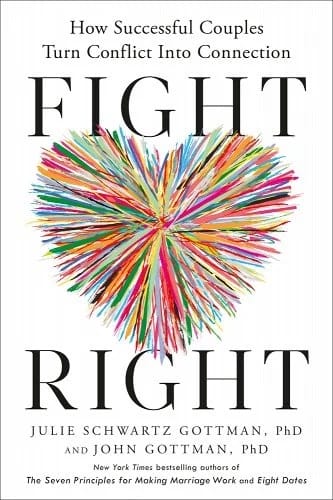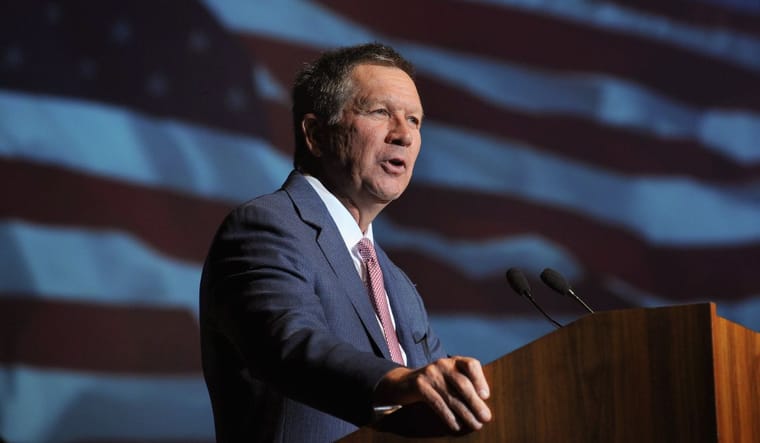Renowned Relationship Experts Julie and John Gottman Show Us How to ‘Fight Right’
Few people can be said to have positively (and publicly) changed the way we view relationships like Julie Schwartz Gottman, Ph.D. and John Gottman, Ph.D. The renowned couples therapists, who are married, have dedicated five decades of on what truly makes a healthy partnership. The data they’ve culled is revolutionary and life-changing, as it’s been the anchor of their coveted workshops around the globe.
Julie and John’s latest book, Fight Right: How Successful Couples Turn Conflict Into Connection, digs into one of the most critical but tough topics of our lives today: why and how we fight. Trying to avoid conflict in a world saddled with conflict may feel easier. But Julie and John say that conflict is not only essential, but it’s also requisite for a deeper connection. The key, of course, is to do it “right” so we grow.
Julie and John chatted with The Sunday Paper to illuminate what we get wrong about conflict, why we get so gridlocked in arguments, and how we can begin to soften into an evolved and curious way of conflict that leads to deeper compassion and connection with others and ourselves.
A CONVERSATION WITH JULIE SCHWARTZ GOTTMAN PHD AND JOHN GOTTMAN, PHD
You start your book with a couple that has been arguing over one thing repeatedly. But you write that there is more below the surface of their argument; there is a fight behind their fight that's really about "their values, dreams, visions." How did you come to see this deeper meaning of conflict?
Julie: This all came about because John and I had a terrible fight. We had a perpetual issue that we talked about for about six years. We couldn't resolve it. We went into therapy about it, and the therapist told us that John could say no and I would just have to comply with that. When we got home, John asked, 'Do I sound like that?' And I said, 'Well, yes.' And we decided that isn't who we are. That wasn't the kind of marriage we wanted. So, we fired the therapist, sat down, and began to interview each other. We asked each other deep questions to understand what was going on in each person's position. The result of that discussion was that I understood so much better where John was coming from, and John understood so much better where I was coming from. Compassion evolved from that deeper understanding—and we did arrive at a compromise, which was wonderful.
Then, we went back to the tapes of the couples [tapes from their decades of research], and we found that the successful couples were doing exactly the same thing we did. It was stunning. So, we simplified the questions that John and I asked each other, and that became the Dreams Within Conflict exercise. When we tried this in couples' workshops, we found that 87 percent of couples made major breakthroughs in their gridlock conflicts. We've used it in therapy, and our clinicians have, ever since.
It's profound to hear this from two people who have been in this work for so many decades. It brings humanity to the topic of conflict.
Julie: I'm glad to hear that. There are some people and some couples who, at first, don't want to mess with this. They don't want to sit down and talk about their fears and what's behind them. But when they do, God does it make a huge difference most of the time.
John: And in terms of couple therapy, it was revolutionary. Many other therapies were saying when people are unwilling to compromise on these issues, they must have some kind of psychopathology, like narcissism or borderline personality disorder. But what we were saying was there's a good reason why they're not compromising because to compromise on these ideals, dreams, wishes, and hopes is to sell yourself out just for the sake of peace in the relationship. No wonder they're not compromising! We can help people get to this deeper level of meaning in each person's position.
Julie: When people weren't articulating the dream within their position on the issue, and then were asked to compromise and give up something essential to them, it was like giving up the bones of their body. It was so core to who each person was.
John: The idea behind this is if you really get behind each person's position and find out what's behind it, then you connect at a deeper level, you merge a deeper level, and you have this understanding about why this is so important to your partner, and why it's so important to you. Then, you can arrive at a compromise.
Why do we get so gridlocked on issues?
Julie: That is another really important piece to this. For most adults, nobody was raised in a perfect home. Everybody has baggage that they're bringing into a relationship. Sometimes they talk about it, sometimes they don't. But often, when people are stuck on a perpetual or gridlocked issue, there may be background or childhood history that is so relevant that it has locked them into an I'm-never-going-to-give-up way. Finding out what that background is is where the compassion comes from. It's healing each other's pain that gets linked to the position they're taking on over a particular issue.
That was true for me and John: I had a great deal of pain that was linked to my position, and John had absorbed the pain of his parents, who were Holocaust survivors. There was so much that was wrapped up in this particular issue. Hearing each other's historical stories directly connected to our positions was astounding.
You both believe conflict is critical in healthy relationships and a healthy world. What do we get wrong about conflict and its purpose?
John: The American view is that conflict is a sign of dysfunction and has no purpose. But we think that conflict has a purpose, which is mutual understanding. As we grow and change over time with new experiences, like becoming a parent or things that happen in our career, we change. A lot of times, those changes result in our minds not being in synchrony. Conflict is inevitable, and the chances that two minds will be in sync all the time are really very low. So, conflict is encountering these differences in one another. Those differences can be sources of mutual understanding, and when they are, you grow closer over time rather than more distant.
Julie: A lot of times, conflict is coming from a place, as we said, that's deep inside of us. One of the things that we've talked about more in our other books is how important it is for each partner to understand and know the other partner's internal landscape. Where are the crossroads in that person? Where's the turmoil? Where is the sinkhole? Where is the volcanic eruption? It's so important to know your partner to fully love your partner. And if one addresses conflict, especially deeper ones, by excavating beneath the superficial issue you're talking about, your partner unfolds their soul for you. You see who they are, what's important to them, what values they have, what their needs are, and what kind of human they are. Because every one of us is unique. Every one of us is a philosopher and has our own sense of life purpose and meaning, no matter how little or how much we're educated. Learning our partners' sense of meaning and what is so important to their hearts and souls is a beautiful way of watching this rose unfold and seeing all the different facets of who your partner is so you can appreciate them all the more.
How can we begin to deeply explore our partner's "internal landscape," as you say, and to know if we are fighting in a way that doesn't help us grow? What are some markers to look out for?
Julie: The first three minutes of a conflict conversation predict not only how the rest of the conversation will go but also what will happen to the relationship years down the road. So this is important.
One marker is: How am I bringing up my complaints to my partner or the issues we need to discuss? Am I doing it by negatively describing my partner with criticism or contempt? Or am I describing myself? Describing yourself means talking about what you feel and what the situation is that is evoking your feelings, and then including what your positive need is regarding the issue. What I mean by positive needs is that you're not talking about what you resent, want to stop, or what you don't like. You're flipping that on its head, and instead, you're talking positively about what you really want and how your partner can shine for you.
Another marker, a favorite of mine that I bring up in therapy with couples, is: Are you confused by why it's so important for your partner to have their position honored? For example, with myself and John, if I am hearing something, I have to think, Do I understand the core of this? And most of the time, I don't. We are not mind readers. So, this is the time to be curious rather than being hostile and trying to win. It is about being curious and asking questions. This is a way to see and understand your partner's internal landscape.
Furthermore, when we ask each other questions, the person answering the question feels Gosh, my partner wants to understand me! They're interested enough to understand me. They want to know me at a deeper level. They want to know how I've evolved. Because we may think we really know our partner from our dating or courtship, but life has a funny way of throwing curveballs at us. In coping with those, we change internally. So, it's important to ask questions.
John: A big marker for me has been reflecting on my defensiveness. When Julie and I were first married, after we had an argument, I would retreat and try to nurse a grudge. I felt like an innocent victim, being falsely accused and not appreciated. I tried to nurse a grudge against her so I could maintain my sense of dignity. At a certain point, I started realizing that I could not nurse a grudge anymore because I had accumulated so many positive things in the relationship. I would go to nurse my grudge, and my mind would say, You know that woman that you're trying to nurse a grudge against took care of you when you were sick. And she also goes out of her way to be kind to you! So, reflecting on my defensiveness and innocent victimhood became a marker for me. I started to realize that was characteristic of me, that I wanted to feel that I was innocent and perfect. But I couldn't do it anymore because of all the many wonderful things in our relationship. So, I realized I had to work on my defensiveness when talking to one another. That was a big one for me.
We're talking about healthy conflict in partnership, but how does this work help humanity at large, regardless of one's relationship status?
Julie: That is exactly why we decided to write this book. In our society and throughout the world, people are getting more polarized and vilifying each other more and more. We're in the middle of massive vilification. It's so painful to see because nobody's listening. Nobody's trying to really understand, Okay, I got my perception, but what are your perceptions? So we have to ask questions.
John: We see this standoff in couples and the world more and more today.
Are we all capable of learning to fight right?
Julie: Most of us are, yes. There is tremendous hope.

Julie and Gottman, PhDs, are world-renowned researchers and clinical psychologists who have dedicated their careers to the fostering of healthy, long-lasting relationships. Julie is an author and the co-creator of The Art and Science of Love workshop. John is a professor emeritus in psychology at the University of Washington, where he founded the Love Lab. Together and independently, they have dedicated five years to this work. Learn more at gottmaninstitute.com.
Please note that we may receive affiliate commissions from the sales of linked products.



